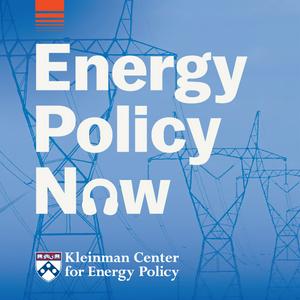Bridging the Partisan Climate Divide
Former Republican U.S. congressman Bob Inglis offers a conservative perspective on climate solutions in discussion with Penn climatologist Michael Mann. --- Politically conservative and concerned about climate change? In this special episode of the Energy Policy Now podcast, Penn climatologist Michael Mann talks with Bob Inglis, former Republican Congressman from South Carolina and current executive director of RepublicEN.org, about bridging the partisan climate divide. In a wide-ranging conversation recorded live during Energy Week at Penn 2025 at the University of Pennsylvania, Mann and Inglis discuss a conservative view on climate change, how conservative messaging on climate has evolved over time, and how common solutions might be found in an era of partisan climate divide. Inglis also offers his view on carbon pricing and strategies to reign in carbon emissions in the U.S. The conversation is moderated by Sanya Carley, faculty director of the Kleinman Center for Energy Policy. Bob Inglis is a former U.S. representative for South Carolina’s 4th congressional district. He is the executive director of RepublicanEn.org at George Mason University. Michael Mann is director of the Center for Science, Sustainability and the Media at the University of Pennsylvania. Sanya Carley is the Mark Alan Hughes faculty director of the Kleinman Center for Energy Policy. Important note on the conversation: Due to a technical problem, the first two minutes of Bob Inglis’ conversation are difficult to hear (from 5:40 to 7:40). We’ve transcribed those two minutes in the show notes, below, to make it easier to follow along. A full transcript of this and all Energy Policy Now podcasts is available on the Kleinman Center for Energy Policy website. Bob Inglis (5:40): Yeah, so for my first six years in Congress I said that climate change is nonsense. All I knew was that Al Gore was for it. And as much as I represented Greenville-Spartanburg South Carolina, that was the end of the inquiry. Okay, pretty ignorant. But that’s the way it was my first six years. Out of Congress six years, as you just heard, doing commercial real estate law again and then, had the opportunity to run for the same seat again before, our son had just turned 18, so he was voting for the first time, and he came to me and he said, dad, I’ll vote for you. But you’re going to clean up your act on the environment. His four sisters agreed, his mother agreed. New constituency, you know. So you got to respond to those people who can change the locks on the doors to your house, you know. So, very important to respond to these people. And so that was step one of a three step metamorphosis. Step two was going to Antarctica with the [House of Representatives] Science Committee and seeing the evidence in the iceberg drillings. Step three was another Science Committee trip and, um, really a spiritual awakening which seems improbable, right, on a godless Science Committee trip, because we all know that all scientists are godless. Right? Well, apparently not. Because this Aussie climate scientist was showing me the glories of the Great Barrier Reef. I could see he was worshipping God in what he was showing me. You know, St. Francis of Assisi supposedly said “preach the gospel at all times. If necessary use words.” So Scott Heron, this Aussie climate scientist who’s now become a very dear friend was doing that. I could see it in his eyes, it was written all over his face. It was in his excitement about what he was showing me. He was clearly worshipping God. So I knew we shared a world view. Forty words were spoken. Related Content How Identity Politics Shape U.S. Energy Policy https://kleinmanenergy.upenn.edu/commentary/podcast/how-identity-politics-shape-u-s-energy-policy/ Climate Action in the Age of Great Power Rivalry: What Geopolitics Means for Climate https://kleinmanenergy.upenn.edu/research/publications/climate-action-in-the-age-of-great-power-rivalry-what-geopolitics-means-for-the-climate/ Energy Policy Now is produced by The Kleinman Center for Energy Policy at the University of Pennsylvania. For all things energy policy, visit kleinmanenergy.upenn.eduSee omnystudio.com/listener for privacy information.

